
Didymoctenia is a monotypic moth genus in the family Geometridae and subfamily Ennominae which was described by Warren in 1901. Its only species, Didymoctenia exsuperata, the thick-lined bark moth, was first described by Francis Walker in 1860. It is found in Australia.
Pamphlebia is a monotypic moth genus in the family Geometridae described by Warren in 1897. Its only species, Pamphlebia rubrolimbraria, was first described by Achille Guenée in 1857. It is found in Sri Lanka, Borneo, Indonesia, Taiwan and Australia.

Symmacra is a monotypic moth genus in the family Geometridae described by Warren in 1896. Its only species, Symmacra solidaria, was first described by Achille Guenée in 1858. It is found in Indo-Australian tropics of India, Sri Lanka, Borneo east to Fiji, Samoa and Australia.
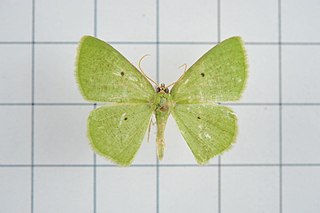
Aplochlora vivilaca is a moth of the family Geometridae first described by Francis Walker in 1861. It is found in Sri Lanka, Indian subregion, Taiwan, Borneo and Sulawesi.
Chorodna strixaria is a moth of the family Geometridae first described by Achille Guenée in 1858. It is found in India, Vietnam, Sulawesi, the Philippines, the Moluccas, New Guinea, Australia and Sri Lanka.

Cleora alienaria is a moth of the family Geometridae first described by Francis Walker in 1860. It is found in Sri Lanka, the Indian subregion to the Andaman Islands, Thailand, Sundaland, Taiwan, and Lesser Sundas as far east as Timor and Christmas Island.
Comostola chlorargyra is a moth of the family Geometridae first described by Francis Walker in 1861. It is found in Sri Lanka, the Indian subregion, the Andaman Islands, Borneo, Java, the Philippines, Sulawesi and Australia.
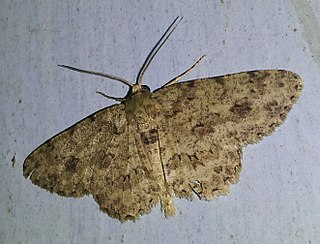
Ectropis bhurmitra, the tea twig caterpillar, is a moth of the family Geometridae. The species was first described by Francis Walker in 1860. A widespread Asian species, it is found around Indo-Australian tropics from India, Sri Lanka and Hong Kong, Taiwan, Thailand, New Guinea to Australian Queensland and the Solomon Islands.
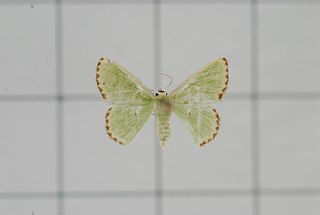
Eucrostes disparata is a moth of the family Geometridae first described by Francis Walker in 1861. It is found in Sri Lanka, Ethiopia, Taiwan, Japan and Australia.

Eucyclodes semialba is a moth of the family Geometridae first described by Francis Walker in 1861. It is found in Sri Lanka, the north-east Himalayas of India, Myanmar and Sundaland.
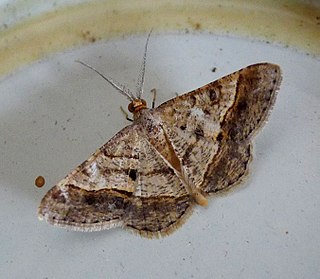
Isturgia pulinda is a moth of the family Geometridae first described by Francis Walker in 1860. The species has a widespread distribution from the African countries of Botswana, Ethiopia, the Gambia, Kenya, Malawi, Mozambique, South Africa, Tanzania, Zambia and Zimbabwe to Saudi Arabia and Yemen towards the Indian subregion and Sri Lanka. In Europe, it is found in the Canary Islands, Spain, Portugal and the Cape Verde Islands.
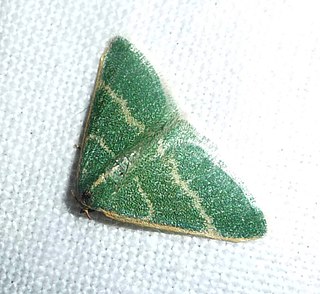
Microloxia herbaria, the herb emerald, is a moth of the family Geometridae. The species was first described by Jacob Hübner in 1808. It is a widespread species that can be found along the Mediterranean region, southern Europe, central Asia towards southern Asia including India, Pakistan and Sri Lanka and to the Russian Far East.
Idaea semisericea is a moth of the family Geometridae first described by Warren in 1897. It is found in the north-eastern Himalayas of India, Sri Lanka, Borneo, Java and the Philippines.
Luxiaria phyllosaria is a moth of the family Geometridae first described by Francis Walker in 1860. It is found in Sri Lanka, the north-eastern Himalayas of India, Sumatra, Borneo, the Philippines and Sulawesi.
Maxates coelataria is a moth of the family Geometridae first described by Francis Walker in 1861. It is found in Sri Lanka and from the Indian subregion to Sundaland.
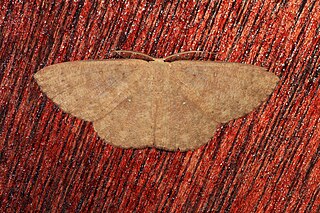
Perixera absconditaria is a moth of the family Geometridae first described by Francis Walker in 1862. It is found in the Indian subregion, Sri Lanka, to Taiwan, Sundaland and the Philippines.
Perixera monetaria is a moth of the family Geometridae first described by Achille Guenée in 1858. It is found in the Indian subregion, Sri Lanka, Sundaland and Sulawesi.
Dysaethria conflictaria, or Epiplema conflictaria, is a moth of the family Uraniidae first described by Francis Walker in 1861. It is found in Indo-Australian tropics of India, Sri Lanka, Thailand, Papua New Guinea, the Solomon Islands and Australia.
Stictoptera trajiciens is a moth of the family Noctuidae first described by Francis Walker in 1857. It is found in Oriental tropics of Sri Lanka, to Sundaland, the Philippines, Sulawesi and New Guinea.

Maurilia iconica is a moth of the family Nolidae first described by Francis Walker in 1857. It is found in Indo-Australian tropics of Sri Lanka, Australia to the islands of Samoa, Rarotonga and New Caledonia.










